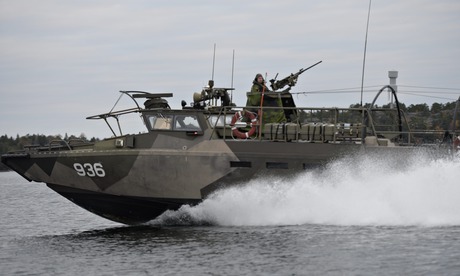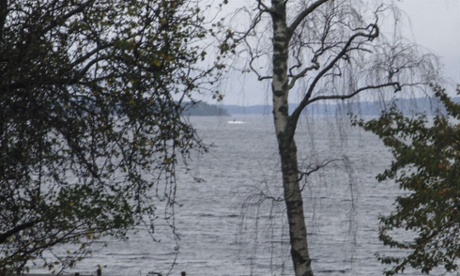http://www.theguardian.com/world/2014/oct/19/sweden-search-russian-submarine-stockholm
Helicopters, minesweepers and 200 service personnel mobilised in search after tipoff about ‘foreign underwater activity’

Swedish armed forces involved in the search off Stockholm. Photograph: IBL/Rex
Hiding a submarine off the shores of a foreign capital might seem a tall order, especially when you have helicopters, ships and 200 troops on your trail. But in a murky and distinctly cold war-reminiscent game of cat and mouse, that is exactly what the Swedish navy appear to suspect Russia of doing.
Sweden’s military has spent three days scouring the waters off Stockholm for what has so far been officially described only as “foreign underwater activity”. However, intelligence briefings to local newspapers suggest a Russian submarine might have had mechanical problems while on a secret mission in the region.
In scenes reminiscent of the 1970s and 80s – when neutral Sweden regularly hunted for Soviet spy submarines in the Baltic Sea around the capital – 200 service personnel were mobilised along with helicopters, minesweepers and an anti-submarine corvette fitted with stealth-type anti-radar masking.
The operation began late on Friday following what Sweden’s armed forces said was a reliable tipoff about something in the Stockholm archipelago, which has 30,000 islands and rocky outcrops around which a submarine could lurk. The officer leading the operation declined to give more details, saying only that there had been no armed contact.
“We still consider the information we received as very trustworthy,” Captain Jonas Wikström told reporters. “I, as head of operations, have therefore decided to increase the number of units in the area.”
The Svenska Dagbladet newspaper said it was believed the intruder was a Russian submarine or mini-submarine that may have been damaged. It said the operation was launched on Friday after a sighting of a “human-made object” in the waters. The day before, Swedish intelligence operators intercepted a radio conversation in Russian on a frequency usually reserved for emergencies, the paper said.

Another signal was intercepted on Friday night, but this time the content was encrypted. However, the report said, Swedish intelligence was able to pinpoint the locations of the participants. One was in the waters off Stockholm, while the other could be traced to Kaliningrad, the port that is the home of Russia’s Baltic Sea fleet.
The military sources would not confirm that a Russian craft was in distress, the Svenska Dagbladet reported, but it added that Russia does have mini-submarines based at Kaliningrad.
Defence analysts cited in other reports speculated that a submarine might have been replacing old spy equipment or monitoring a Swedish naval exercise.
Russia, for its part, has denied this, saying its submarines and ships are “fulfilling their tasks in the world’s oceans”. A defence ministry spokesman in Moscow said: “There have been no emergencies or accidents with Russian military vessels.”
Sweden is among a series of Nordic and Baltic nations on increased alert over growing tensions with Russia in the wake of the Ukraine crisis. In September two Russian Su-24 attack jets reportedly violated Swedish airspace over the Baltic, prompting Sweden’s air force to scramble its own fighters.
Last week Finland complained that the Russian navy had twice harassed one of its environmental research ships in international waters, ordering it to change course and later sending a helicopter and submarine to pass close by.
The submarine hunt is an early political test for Stefan Löfven, Sweden’s new prime minister, whose centre-left minority government took office this month. Peter Hultqvist, the defence minister, told Svenska Dagbladet that the government hoped to be more open than its predecessor about military activity.
“What’s been happening in the Baltic Sea, including airspace incursions, shows that we have a new, changed situation,” he said. “Russia has made enormous military investments … with their increased strength they are training more, and that influences the security environment.”




